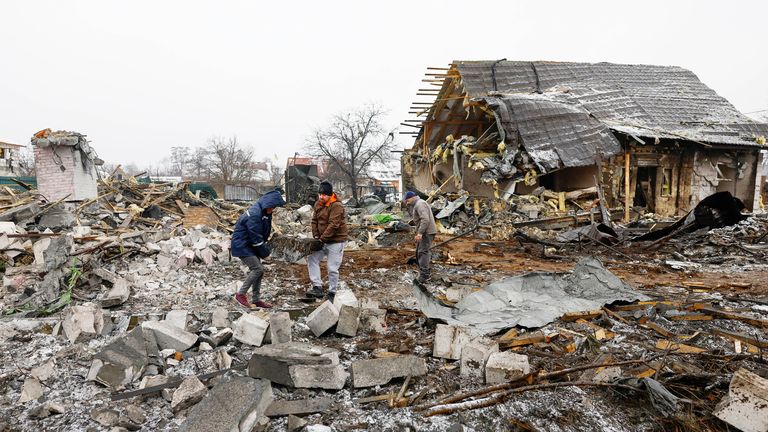Three months ago, Ukraine’s president came to Washington and told the US’s politicians: “If we don’t get the aid we will lose the war.”
Just 11 short weeks later, Volodymyr Zelenskyy is back in Washington because his warning appears to have gone unheeded.
The men and women of the United States Congress, who he will meet, have been unwilling, since September, to approve more funding to send more weapons to Ukraine.
Funding is due to run out in a couple of weeks.
“There is no magical pot of funding available to meet this moment. We are out of money, and nearly out of time,” the US government’s Office of Management and Budget said in a recent letter to Congress.
President Biden has warned repeatedly that world order as well as European and American security depend on continued military support for Ukraine in its fight to repel Russia’s advance.
A number of things have complicated his argument and jeopardised Ukraine’s fight.
Ukraine’s tough battle
First of all, material successes on the battlefields of Ukraine have been slow.
Expectations were always well ahead of the reality of the challenges on the ground – remember all the talk of the spring offensive?
Ukraine has failed to break through the Russian lines.
Ukraine
The slow progress has prompted more people to question the merits of the battle and the extent to which the US should continue to plough money into a faraway war – and remember for many small-town US voters living pay-cheque to pay-cheque, with problems closer to home, it does feel very far away.
The US’s political gridlock
And that’s the second complication here: politics.
Ukraine was once an issue that enjoyed bipartisan support, but it has now become hostage to domestic politics.
Republican politicians have demanded their support for Ukraine be dependent on Biden toughening the US’s domestic asylum rules as the migration crisis on the southern border with Mexico mounts.
At the beginning of 2023, with the planned spring offensive ahead, the US provided about $2.5bn worth of military assistance for each of the first three months. After that, it steadily fell.
By halfway through the year, the packages were down to less than a billion and for the past few months they have been considerably under $0.5bn.

Local residents remove debris next to their neighbour’s house in Kyiv in December
Supporters of the funding argue that Biden has not done a good job in explaining to the American people why the seemingly huge sums of money are actually good value for the American people.
“For pennies on the dollar we are seeing the Ukrainians essentially dismantle the conventional armed forces of the Russian Federation. All of this is happening without a single American pulling a trigger or getting shot at,” Luke Coffey from the US think tank the Hudson Institute said.
The UK’s new Foreign Secretary David Cameron was in Washington last week also calling for the US to focus on what he thinks is at stake.
“I don’t think I can remember a time when the need for international solidarity and action to tackle events has been more important for our own collective security,” Lord Cameron said.
“I simply don’t think there is, in any of our countries, a sort of ‘put up the drawbridge’ and think you can insulate yourself,” he said.
Read more:
How the Kremlin creates nation of patriots
David Cameron’s Ukraine trip shows its importance to the UK
Cameron met Republican and Democratic politicians on Capitol Hill.
“Sometimes hearing something from our greatest ally and partner has a greater resonance,” US Secretary of State, Antony Blinken, who is hoping Congress agrees to extra funding, said of Cameron’s intervention.
A new war
The third complication in the 11 weeks since Zelenskyy was last here is a new war.
The Israel-Gaza conflict has had a huge and somewhat discombobulating impact on the geo-political landscape. It has also further stretched the funding and weaponry available.
Zelenskyy is here because he is now extremely worried and because Biden believes the powers of persuasion come best from the Ukrainian president himself.
There are days left before US funding for Ukraine stops altogether. Zelenskyy is panicking. Putin is watching.







